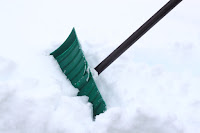 |
| © Luckydoor | Dreamstime.com - Snow Shovel |
This large study took place from 2010 to 2015 and looked at over 400,000 adults who had been hospitalized at two hospitals in Boston. The researchers assessed patients who had been admitted with cardiovascular conditions and cold-weather conditions (frostbite and falls/injuries). Interestingly, the researchers found that admissions to hospital for patients with heart disease occurred most often (increased by 23%) after moderate snowfalls, defined as 5 to 10 inches, rather than high snowfalls. Cardiovascular disease admissions actually dropped by 32% on high snowfall days, the authors wrote.
One theory that might explain why moderate snowfalls have more of an effect is that people may stay inside more during heavier snowfalls and that moderate falls seem easier to manage.
So be careful, even if the snowfall isn't drastic and beware of the signs and symptoms of a heart attack for a few days after your time shovelling snow:
- Pressure, tightness, pain, or a squeezing or aching sensation in your chest or arms that may spread to your neck, jaw or back.
- Nausea, indigestion, heartburn or abdominal pain.
- Shortness of breath.
- Cold sweat.
- Fatigue.
- Lightheadedness or sudden dizziness.
No comments:
Post a Comment
Thanks for visiting! Please leave a comment - doesn't matter if you agree or not. Good discussion is always encouraged. Disrespectful comments are not and shall be deleted.
I apologize for the annoying word verification step. Spammers are just too active otherwise.